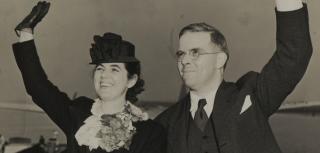When the Phone Rings, Will You Answer the Call for Justice?
By Carey McDonald
Call and Response
-
Resources for Faith Development: February 2026
Joy Berry
From Call and ResponseOur communities, congregations, and families need the blessings of faith now, more than ever. This month’s resources encourage learning and action to build the beloved community even — and especially — when despair, anger, and grief threaten to overwhelm us.
-
Resources for Faith Development: January 2026
Joy Berry
From Call and ResponseWith the blur of the holiday season behind us, you may be looking for plug and play ideas and resources that make the little decisions easier now — especially if you are gearing up for new trainings and programs in the Spring.
-
Resources for Faith Development: December 2025
Joy Berry
From Call and ResponseIn this busy time at year’s end, religious educators and volunteers may be stretched thin by the abundance of “holy days and holidays”: so many congregational events, pageants, ceremonies, and celebrations happening! We hope the resources offered here can make some part of it just a little easier.
This fall, Unitarian Universalists have a rare and profound opportunity for faith development when Defying the Nazis: The Sharps’ War airs on PBS on September 20, 2016. The 90-min. film tells the story of two WWII Unitarians who went into Nazi-occupied Europe to help hundreds escape. When I previewed the film, I felt proud that my religious ancestors had shown such courage, yet sad to see the terror and misery inflicted by the Nazi regime and our own country’s slow response to counter it.

Martha and Waitstill Sharp; photo copyright UU Service Committee.
Most of all, I felt wonder: Would I have made the same choice the Sharps did, if the phone had rung for me?
Though the specifics are different, the hated, fear, and bigotry that Martha and Waitstill Sharp fought against is still present in our world today. With the national broadcast of this documentary, boosted by Ken Burns’ production company and Tom Hanks’ narration, the whole country will be talking about it. This makes it a great opening for Unitarian Universalist learning, reflection, and action, as we see ourselves and our values reflected in that national conversation. Themes of justice, interfaith connection, sacrifice, and risk are ripe for exploration through curricula and discussions.
PBS and the UUA’s Faith Development staff consider the film to be at about a PG rating. Though the film does not contain graphic violence, its themes are obviously mature. It could be appropriate for an advanced 4th or 5th grade group; typically, WWII and the Holocaust are not covered in school until later grades.
Next Steps!
Plan to watch Defying the Nazis on your local PBS station on September 20, 2016. In advance, explore these ways for your congregation to engage people of all ages with the film (and its companion book from Beacon Press):
- #WeDefy Congregational Action Guide
This guide was developed to help congregations take action inspired by Defying the Nazis. Starting on page 30, you’ll find links to related interfaith and social justice activities, in the Tapestry curricula Toolbox of Faith, A Chorus of Faiths, Building Bridges, and Faith Like A River. - We Who Defy Hate: An Interfaith Preparation for Social Justice Action
The Fahs Collaborative at Meadville Lombard Theological School developed this adult curriculum to support people of different faith traditions to undertake justice actions based on common ground and solidarity. - Books from the UUA’s Skinner House
Two books offer great perspectives on Jewish and Muslim experiences, key to understanding the human rights issues the Sharps faced and the ones we still face today. Muhammad: The Story of a Prophet and Reformer by Sarah Conover draws from biographies, the Quran, and hadith to relate the story of a radical prophet who challenged the rich and powerful, guided his community of followers through a dangerous time of persecution and exile, formed alliances with people of different beliefs, and preached “love for humanity what you love for yourself.” For readers 12 and up, and with a foreword by Eboo Patel. Anne Frank and the Remembering Tree provides an age-appropriate way to introduce children ages 6-9 to the Nazi Holocaust. It tells the story of Anne Frank and her sister Margot, who loved a tree, and the tree who promised never to forget them. - A few more tools:
- The Compassion for Refugees Collection is available on the UUA WorshipWeb.
- Facing History and Ourselves, an independent partner of the film,offers free online activities about the Sharps.



